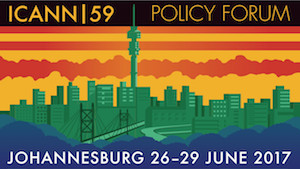GAC and ccNSO meeting
10 Jul 2017 02:00h
Event report
The purpose of this session was for the Government Advisory Committee (GAC) to receive updates from the Country Code Names Supporting Organization (ccNSO) about a number of issues.
The session was moderated by Mr Thomas Schneider (GAC Chair), who started by welcoming GAC members, especially new ones who have just joined the group. He then presented the two main points on the agenda, namely, an update on the ccNSO Policy Development Process (PDP) on retirement and review mechanisms of country code top-level domains (ccTLDs); and an update on the activities of the Cross-Community Working Group (CCWG) on the use of country and territory names as TLDs.
Ms Katrina Sataki (ccNSO Chair) introduces Ms Annebeth Lange, co-chair on the Cross- Community Working Group on the use of country and territory names, and Mr Bart Boswinkel, Senior Director, ccNSO Policy Development Support, ICANN).
Regarding the first item on the agenda, Boswinkel reported that the issue is now up for public comments. He also said that the working group (WG) on ccTLDs retirement and review mechanisms is still welcoming comments from GAC members who think the topic is relevant, until 10 July. On that point, Schneider responded that they have tried to gather comments but since there was not enough substance gathered, they have not submitted them. He wanted to assure the WG that the GAC takes this issue very seriously. Schneider assured them that the GAC will produce more comments with substance in the near future, before the deadline.
Boswinkel mentioned that there was an upcoming meeting of the WG and that everyone interested in further discussion is welcome. The subjects under discussion will be the workings and definitions used under the ISO 3166 standard and the role of the maintenance agency, and how the Public Technical Identifiers (PTI) – the Internet Assigned Numbers Authority (IANA) functions operator – treats ccTLD retirements, and the practice and procedures they use with respect to ccTLDs.
Lange presented the second item on the agenda – the use of country and territory names as TLDs, and gave an update on the CCWG activities.
Lange gave a short background to the newcomers. She said that the working group was formed in March 2014 as a result of the study group on country and territory names that had worked before. She pointed out the number of years spent on work without any real consensus from their discussions. The latest report was published for comments in February 2017 but not many comments have been received so far.
Lange said that few voices in the Generic Names Supporting Organization (GNSO) want to open two letters that are not country codes today (allowing their registration as generic top-level domains (gTLDs)), but that there is broad agreement on reserving those codes for countries that may be formed in the future in the world.
In her remarks, Lange called everyone to make more comments during the public forum because there are difficult geographical questions that still need to be solved despite there being no real consensus on the issue so far. Another solution, she said, would be to establish a new CCWG on this, but she thinks that this would be difficult. She hopes that during the policy forum, many questions will be asked and that they will come up with a solution that will make countries, the ccNSO, and the GNSO happy.
Lange said that people want more restriction because there were a lot of geographic names that were not covered in the applicant guidebook in the first round, which was a problem for some countries. Regarding the guidebook, Sataki thought it was still a useful tool because it took years to put together, and it should not be fixed because it is not yet broken.
Schneider thanked the ccNSO for the updates on the work they have been doing on the issue of geographical names, and the use of territory and country names as TLDs.
Related topics
Related event

